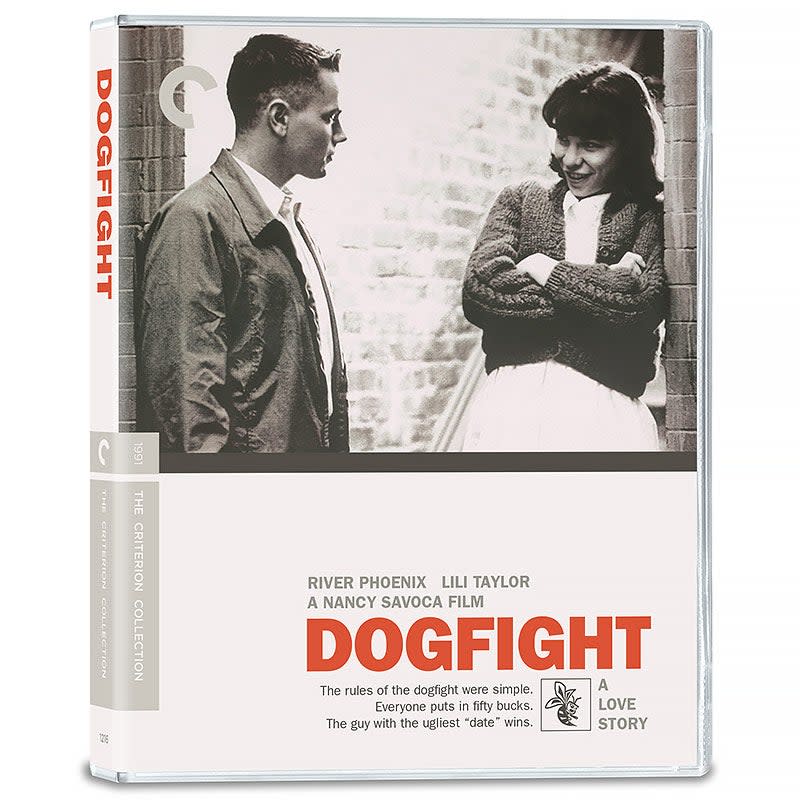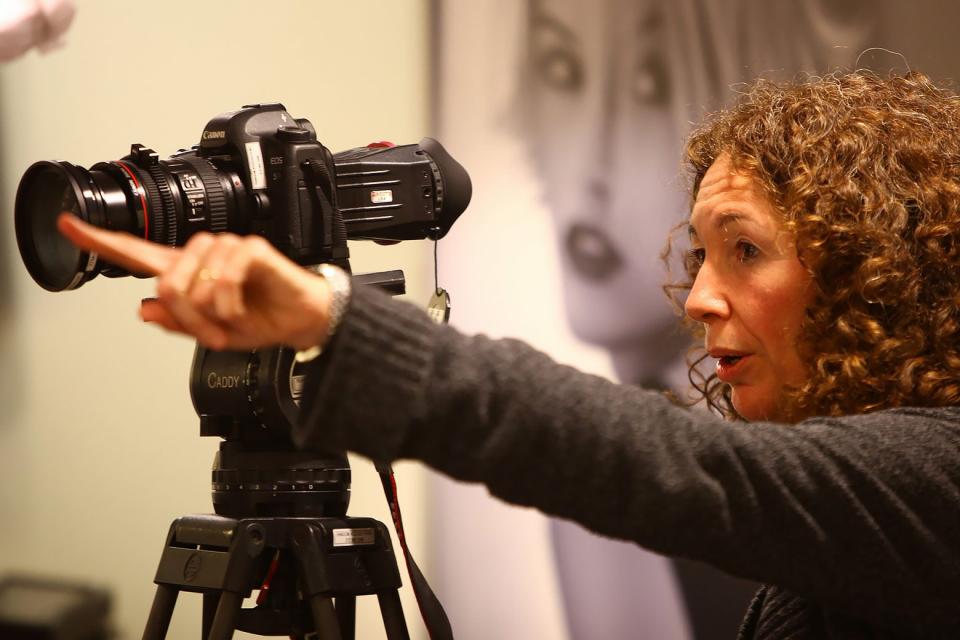The Forgotten River Phoenix Movie That Shows What He Could Have Been
- Oops!Something went wrong.Please try again later.
- Oops!Something went wrong.Please try again later.
When director Nancy Savoca won the Sundance Film Festival for her first feature, the New York–set wedding drama True Love, she was flooded with scripts, “most of which had girl or Jersey or something in the title,” she recalls. She wanted something different, and signed on to a screenplay about a young Marine who participates in an “ugly-date” contest with his barracks-mates just before they’re shipped to Vietnam in 1963. The film’s provocative title: Dogfight.
In Savoca’s hands—as well as those of River Phoenix, then at the peak of his fame, and Lili Taylor in one of her first major roles—Dogfight evolved from the young man’s coming-of-age its script promised into a delicate two-hander between an optimistic, sweet singer and an angry soldier who questions the version of masculinity he’s been forced to perform all his life. As Dogfight joins the Criterion Collection this week, I spoke to Savoca about figuring out a movie on the fly, shooting “the most awkward sex scene you’ll ever see,” and the beauty of River Phoenix—the great lost actor of his generation. Our conversation has been edited and condensed for clarity.
Slate: At the point that you came on board, River Phoenix was already connected to the movie. What was your first meeting with him like?
Nancy Savoca: It was on the telephone. I had heard from the studio that they were good with me, but now I needed to speak with River to see if he approved. And he was 19 years old.
Nineteen years old with director approval!
Honestly, his career was so much longer than mine at that point. This was my second film. He’d done—how many amazing films this boy did. He called it his first adult role. And he wanted to take on someone that he just did not understand and was so, so, so different from who he was. And I thought that was very bold and that kind of attracted me even more to the project. Because I wasn’t sure if I was going to get someone—and at that point, I couldn’t articulate this—if I was going to get a star that I had to preserve, or if I was going to get an actor that wanted to go on a journey.

Both kinds of actors are important to the way a movie works on screen. But this required a certain kind of actor interested in doing a certain kind of thing, to match what you were doing at the time.
Yeah. Someone who’s ready to jump into the abyss. And what had attracted me to the movie was that I was interested in stepping away from what I had just done and doing something different from my first film. It didn’t make me think, Oh, I know I can do this. Which I later came to regret because I didn’t know how to do it.
How did Lili get cast?
I remember we were talking to people who were 19 and 20 years old and saying, “Oh, and your character is the girl who gets chosen to be in an ugly girl contest.” In this industry that is all about young women and their faces and their bodies—they know they’re coming in to be judged. I’d never anticipated how fraught that would be. Lili, what she had in common with River is she was curious about this situation. She was curious about who this person is.
The role seems so different from what I understand River Phoenix’s actual personality to be. It was obviously a huge change from the kinds of sensitive young men that he’d been playing. What did you talk about with him when you discussed the character, and did he struggle with his performance?
He struggled from the get-go. He knew it was going to be hard. But the honesty and curiosity we were all working with … well, it got us into so much trouble. The script was based on [screenwriter] Bob Comfort’s actual experience as a Marine, and we kept pulling at it and finding more and more things that needed to be addressed with these characters. We were in the thick of it, and we were all realizing, My God, if this doesn’t come out right, this could be a horrible film.
Yeah.
This could be a movie that ends up doing the opposite of what we’re hoping to do with it.
So pulling it apart and trying to solve the problems: That was something that all of you were doing, Lili and River and you?
Yes. What Bob Comfort did really, really well is: He was brave enough to give this experience of participating in a dogfight. Not many people would admit to having that experience. But in his effort to understand it, he created the character of Rose to be a catalyst for this young man’s conversion.
Right.
And I have this amazing actress to play Rose, but she’s capable of all these things and that character isn’t yet fleshed out. We kept adjusting and fine-tuning and deepening, and it was just going in the direction of who River and Lili were, bringing their characters along. Most of the time they were easy adjustments. But the scene where he comes back to apologize for the dogfight and Rose goes, “OK, I’ll go out with you”—that was a nightmare.
I bet! How do you address that?
That was a nightmare scene. Oh my God, Lili, who is the consummate professional—in the script she had to cry and let him know how much he hurt her, and then he would say, “I’m sorry.” It was sort of like what you would imagine.

Right.
And she couldn’t do it. And then she kept excusing herself, saying, “Let me just try this again.” And then it started raining on us. We shut down the set, which we could not afford to do, and we asked people to go to lunch. And Lili said, “Why do I say yes?” And then River’s like, “Yeah, why would she say yes?”
And I was like, Oh, shit. I run to Rich, my partner, who produces all my movies. I said to him, “She can’t say yes. Why would she say yes? What kind of person would say yes to someone that just did that to them?” And Rich is like, “She has to say yes, because we only have half an hour of a film, and I don’t know what we would say to Warner Bros. if we end it here.” And so we worked on it and worked on it.
Can we talk about their love scene?
The most awkward sex scene you’ll see.
I saw this movie when I was 17, in the theater.
Oh my God. I love hearing that. You were one of the rare people who actually saw it on a big screen.
My best friend was a huge River Phoenix fan. The love scene was very memorable for me, because it just looked and felt different from any other sex scene in any movie I’d ever seen. It was not like this big, sweaty, moodily lit body thing where they’re overcome by passion. They’re awkward, but the thing that I really remember is that she is smiling the whole time. She’s smiling a little nervously, but she’s also obviously just really happy. It was like an awkward partnership that seemed really meaningful to both of them.
By that point, we were more than midway through the shooting. By that point, we had established this thing, this mood, and it was now time to just follow what was going to happen. And that was what told us: This is not the sweaty sex scene that you talked about that we all knew. It was about honesty. Lester Cohen, our production designer, found this musical bingo game.
Oh yeah.
It was so perfect for her to have that. And then she tried to get him to play it, because she was nervous, and it was like this improv between them. And I think the smile—maybe—I’m guessing the smiles began then. And then the fact that then there was this beautiful attraction between them that neither of them knew what to do with.
I can’t watch a River Phoenix movie now without thinking of all the great movies that he might’ve made in his life. He really had great taste. He had a real questing spirit. When you remember him, what do you think about?
One day we broke for lunch and he and I were walking to his trailer. And there was a marching band coming down the street—a parade, an ethnic celebration, Sweden Day or something. All these beautiful little blond girls in majorette outfits. And they saw River, and they broke the parade and ran for him. We ran! It was so scary, this amount of young teen hormonal energy coming at him. It was like being inside Beatlemania.
Wow.
We all ran into his trailer and he sat there, visibly shaken. The girls surrounded the bus. And then the most beautiful thing happened. He kind of centered himself, and he said, “I’m going to go out and talk to them.” I remember hearing what he said to them. He said, “Listen.” He said, “I will sign whatever you need, but get back in the parade because that’s going to be more important to you than me.” [Laughs.] I mean, maybe, maybe not. But he said, “I’m not just a symbol. I’m a person too.” Just this really heartfelt honesty, directly to fans, which was so not of that era. That’s who he was. He’s a beautiful guy.

